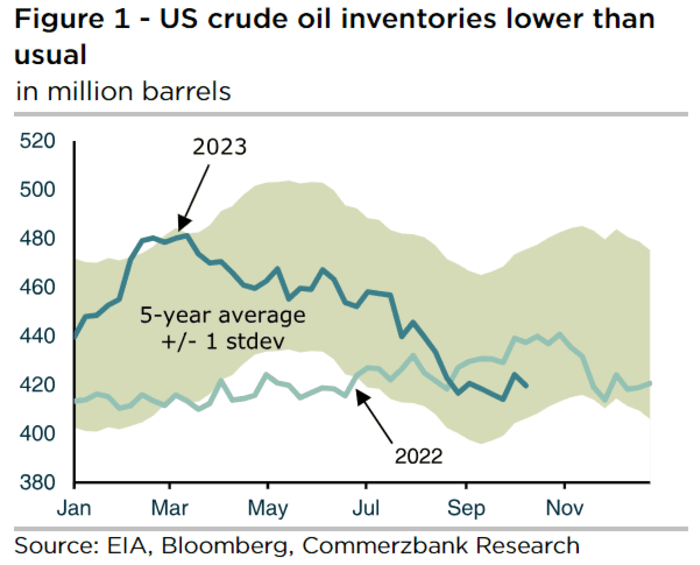This post was originally published on this site
Oil futures rose Friday, on track for a second straight weekly gain after the Oct. 7 attack on Israel by Hamas that sparked a war that threatens to spillover across the region, potentially endangering the supply of crude.
Price action
-
West Texas Intermediate crude for November delivery
CL.1,
+1.26% CLX23,
+1.26%
rose $1.23, or 1.4%, to $90.66 a barrel on the New York Mercantile Exchange, on track for a 3.3% weekly rise. December WTI
CLZ23,
+1.19% ,
the most actively traded contract
CL00,
+1.19% ,
gained $1.39, or 1.6%, to $89.76 a barrel. -
December Brent crude
BRN00,
+1.07% BRNZ23,
+1.07% ,
the global benchmark, was up $1.25, or 1.4%, at $93.63 a barrel on ICE Futures Europe. -
November gasoline
RBX23,
+1.31%
rose 1.4% to $2.395 a gallon, headed for a 5.7% weekly advance. November heating oil
HOX23,
+1.20%
gained 0.9% to trade at $3.203 a gallon, but was set for a 3.3% weekly fall. -
November natural gas
NGX23,
-1.32%
lost 0.2% to $2.95 per million British thermal units, on track for a nearly 9% weekly slide.
Market drivers
Oil was lifted in electronic trade late Thursday after a U.S. Navy warship has intercepted multiple missiles near Yemen. A Pentagon press secretary told reporters that a Navy destroyer intercepted three missiles and several drones that were launched by Iran-backed Houthi forces in Yemen, but their target was unknown.
Expectations for an imminent Israeli ground invasion of Gaza have helped push up crude prices this week, analysts said, amid rising tensions across the region.
While the conflict so far hasn’t altered the supply picture, “the tense situation in the Middle East does justify a certain geopolitical risk premium for the time being,” said Barbara Lambrecht, commodity analyst at Commerzbank, in a note.
“Oil prices are therefore likely to remain well supported, especially as the oil market is significantly undersupplied at present anyway,” she said, noting that U.S. crude-oil stocks are now nearly 5% lower than usual for this time of year, compared with February when they stood 10% above the five-year average (see chart below).

Commerzbank
Separately, the U.S. Energy Department said it would post monthly solicitations to buy oil for its Strategic Petroleum Reserve through at least May 2024, with the first request for up to 6 million barrels of oil for delivery in December and January. The government agency said it plans to buy oil at a price of $79 a barrel or below, which is less than the average $95 it received for 2022 emergency SPR sales.

